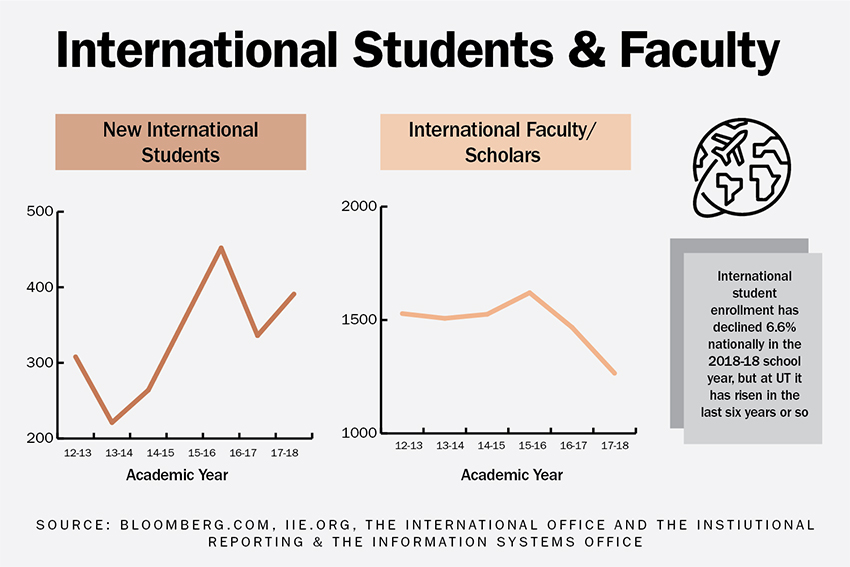Correction: This story has been updated to accurately reflect the University's enrollment numbers. The Texan regrets this error.
UT’s enrollment of international students who are first-time freshmen saw a greater decrease between the 2016-17 and 2017-18 school years than the national decline in first-time freshman international students — a trend experts blame on the Trump administration’s immigration policies and rhetoric.
During the same time period, enrollment of international students who are first-time freshmen dropped 6.6 percent nationally, it dropped at UT by 26 percent, from 452 students to 336, according to data from the UT’s Institutional Reporting, Research and Information Systems office and the Institute of International Education. Some of this can be accounted for due to a 4 percent drop in total enrollment between each freshman class.
Law professor Denise Gilman, the director of UT’s Immigration Clinic, said the travel ban, increased wait times to receive a visa and more stringent immigration interviews at U.S. consulates in foreign countries could all be causes for the drop. “My guess is the bigger impact is not so much direct barriers to coming, but the message that foreign students and academics will not be fully welcomed here,” Gilman said.
From 2012 to 2016, new international enrollment grew, with some fluctuations, by 17 percent nationally and by 16 percent at UT.
It began to decline nationally in 2016 but continued to climb at the University during that year until the 26 percent drop.
Gilman said these drops could result in serious financial costs to post-secondary institutions, which often rely on tuition from international students.
“For those who do come here from abroad, they may also be less likely to stay here long-term,” Gilman said. “So, we’ve really invested in a student without being able to enjoy the benefits of having that student become a professional or researcher within the (United States).”
At the same time that new international enrollment has been affected, UT has also lost international faculty and scholars. Between 2016 and 2018, the number of international faculty and scholars dropped by more than 20 percent, from 1,620 to 1,265.
Gilman said international faculty, who often have high qualifications, could just as easily go to another country for research. Gilman said the type of visa they use, H-1B, has become harder to get.
However, Margaret Luévano, interim director of International Student and Scholar Services in the International Office, said in an email that UT often works with students and scholars who have concerns about their individual immigration circumstances.
“We deeply value our international students and scholars,” Luévano said. “They are an integral part of our community and their contributions are part of what make UT-Austin a leading global university, so we work hard to create a welcoming and inclusive environment where they feel supported.”
As of the 2018-19 school year, however, UT has regained some of its losses, with a 16 percent increase in new international enrollment. Mechanical engineering freshman Richard Soegiantoro said he only applied to schools in the U.S. and President Donald Trump’s immigration policies did not affect his decision.
However, Soegiantoro, who is from Indonesia, said he was worried about safety because of the increased number of shootings in the country. Nevertheless, since his parents and siblings all went to school here, he decided to attend anyway.
“My parents always wanted me to study (in the U.S.), so as a kid, it kind of got set in my mind,” Soegiantoro said.
Want more content like this in your inbox every morning?
- The Daily Digest
- The Lege
- The Big Scoop
- The Weekly Rewind




















